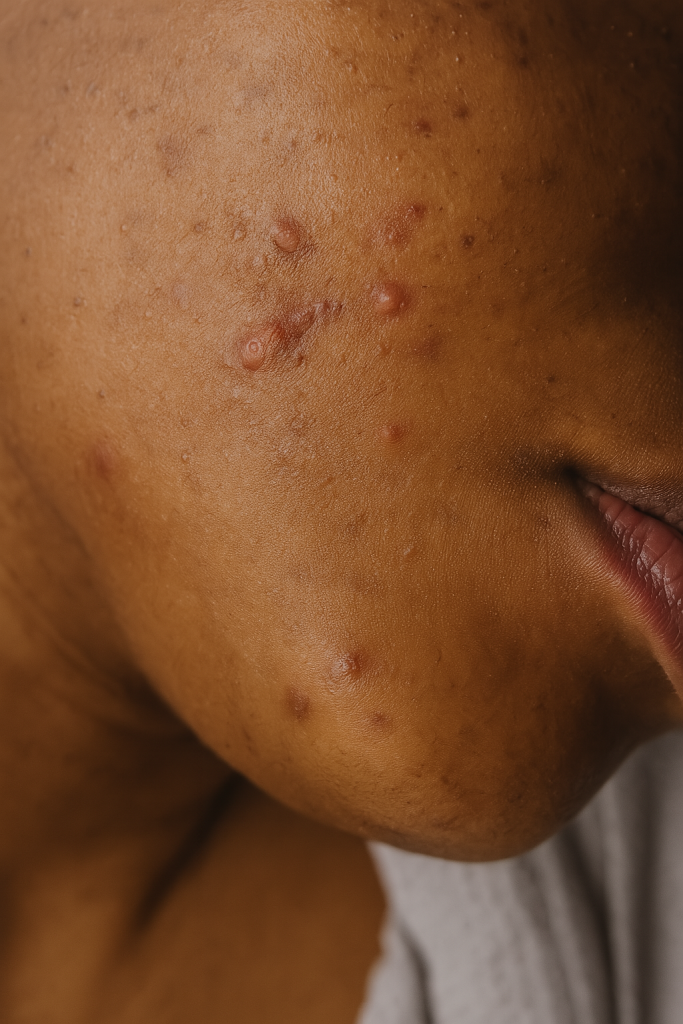
If you’ve tried every acne product and nothing’s working, your issue might not be the acne itself. It could be your skin barrier.
First off, do you know your skin type? Take our free skin type quiz to find out.
What Even Is the Skin Barrier?
Your skin barrier is the top layer of your skin.
Its job is to:
- Lock in hydration
- Block out bacteria, pollution, and irritation
When it’s healthy, acne can heal.
When it’s damaged, your skin goes into stress mode. That means:
- Breakouts won’t go away
- Redness sticks around
- Products that used to work now make things worse
How to Tell If Your Skin Barrier Is Damaged
You don’t need a microscope — just pay attention.
Here are signs:
- Your skin burns or stings after products
- You’re breaking out in new areas
- You feel tightness, dryness, or random itchiness
- You’re suddenly sensitive to everything
- Your skin feels worse the more products you try
What’s Damaging It?
For acne-prone skin with ADHD, common barrier triggers include:
- Cleansing too much (especially with foaming or drying cleansers)
- Jumping between products daily
- Forgetting moisturizer — especially after using actives
- Layering too many treatments at once
- Stress, sleep issues, diet changes
How to Fix It (ADHD-Friendly Version)

Keep your routine simple and repeatable. This isn’t the time to cleanse, treat, and protect. The aim is to build your barrier to a point where treatments can actually work.
1. Gentle Cleanser
- Simple formulas and no scrubs.
- Stick to a balm or oil cleanser.
- Use the same one daily for now.
2. Moisturizer with Barrier Support
- Look for ceramides, cholesterol, and humectants (like hyaluronic acid or glycerin).
- Apply it right after cleansing, even if you’re tired.
3. Optional: Barrier Oil
- For dry skin, seal with a few drops of oil: vitamin F, squalane, or rosehip.
- If you’re oily or acne-prone, skip this or use sparingly.
4. Sunscreen
Sunscreen is especially important when your skin barrier is damaged. It prevents scarring, hyperpigmentation, and further damager.
- Remember: your skin is at its weakness and really needs to be protected from the elements.
- Super hack? Be sure to get a mineral-based or gel-type sunscreen and go for fragrance-free, alcohol-free, and non-comedogenic.
- You’ll also want to avoid heavy, greasy formulas (especially if you’re sealing with oil at night)
What to Expect: A Realistic Timeline
| Timeframe | What’s Happening |
|---|---|
| Days 1–3 | Skin might still feel irritated or breakout-y. That’s normal. |
| Week 1 | Sensitivity starts to calm. Breakouts may slow down. |
| Week 2–3 | Skin looks more stable. Fewer flare-ups. Texture improves. |
| Week 4 | Barrier is stronger. Acne responds better. You can reintroduce treatments slowly. |
Product Suggestions by Skin Type
| Skin Type | Cleanser | Moisturizer | Optional Oil | Sunscreen |
|---|---|---|---|---|
| Dry | Oat balm / oil cleanser/ CeraVe Hydrating Facial Cleanser | CeraVe Moisturizing Lotion for dry skin / Avene Tolerance Control Soothing Skin Recovery Cream | Vitamin F, Marula | Avene Very High Protection Fluid SPF 50+ |
| Oily | CeraVe Hydrating Facial Cleanser | Avene Tolerance Control Soothing Skin Recovery Cream | None or Squalane (light, non-greasy) | Avene Very High Protection Fluid SPF 50+ |
| Sensitive | CeraVe Hydrating Facial Cleanser | Avene Tolerance Control Soothing Skin Recovery Cream | None or very minimal | Avene Very High Protection Fluid SPF 50+ |
| Combo | CeraVe Hydrating Facial Cleanser | Avene Tolerance Control Soothing Skin Recovery Cream | None or Jojoba or Grapeseed in dry areas | Avene Very High Protection Fluid SPF 50+ |
Simple ADHD Skincare Routine for Damaged Skin Barrier
| Time | Step |
|---|---|
| 8:00 AM | Wash your face with warm water |
| Moisturize | |
| Apply a few drops of oil if suitable to your skin type (see table above) | |
| Apply sunscreen which is extremely important for damaged barriers. |
| Time | Step |
|---|---|
| 8:00 PM | Wash your face |
| Moisturize | |
| Apply a few drops of oil if suitable to your skin type (see table above) |
Final Notes (For Your Brain, Not Just Your Skin):
- Don’t track perfection. Track consistency.
- Set reminders if you forget steps.
- Avoid chasing the “new product that might fix it.” Focus on stabilizing first.
Once your skin is calm, your acne will be easier to treat — and your routine won’t feel like chaos every day.
